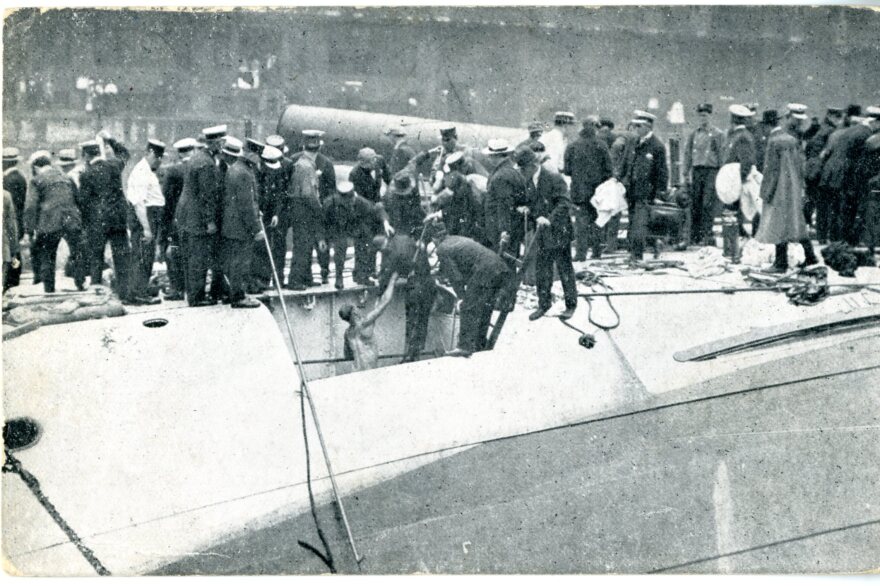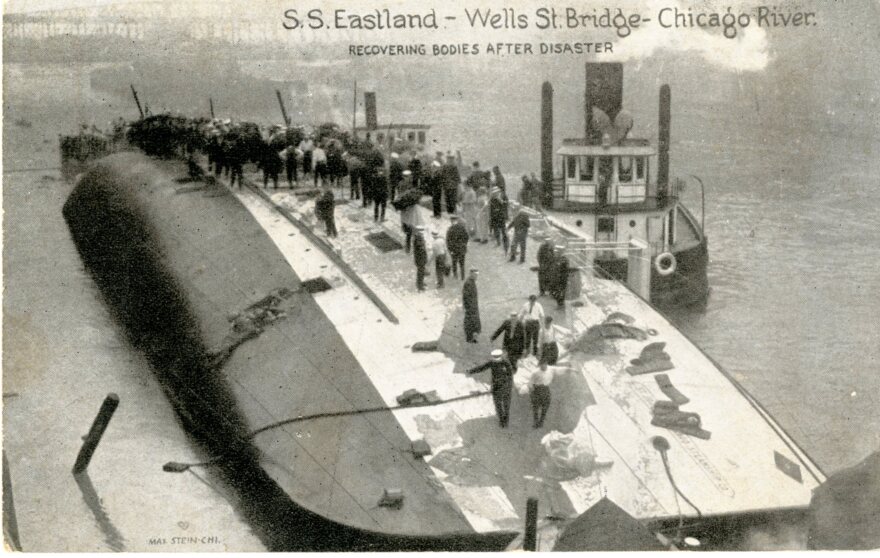July 24th marks the 100th anniversary of a huge, yet largely forgotten event in Great Lakes history: the wreck of the SS Eastland. Its story is tragic. June 24, 1915. Thousands board the Eastland from Chicago, including hundreds of Western Electric workers. And then, while still docked, the Eastland tips over, with passengers still on board. People rush to help, but more than 800 die.
"And it is considered the Great Lakes’ worst disaster in terms of loss of life," says historian Caitlyn Perry Dial. "And how did I not know about it?"
Dial considers herself pretty knowledgeable about Great Lakes history. She’s going for her PhD at Western Michigan University. She used to work at the Heritage Museum in St. Joseph. That’s where she found out about the wreck.
"And in this box, there was a category called 'Disasters,'" she says. "And going through the postcards, I saw these pictures of bodies being pulled out of the water, a boat tipped on its side. And just was really intrigued, first of all, that there were postcards made out of this. It went through the mail! And then I wanted to just learn more about it."
This wreck was huge, Dial thought. So how had she never heard of it? She kept digging to find out.
"The more research I did, I realized there was a huge question burning that I needed to answer," Dial says. it "Why isn't the Eastland more memorable? What happened in the almost 100 years since the wreck that made people forget about it?"

Those questions became the basis for Dial’s PhD thesis. Quickly, she got an answer to the first part. Dial talked with historians and descendants of survivors. They were honest. They told her people just don’t care about an event if famous people aren’t a part of it.
"You think about the Titanic. And you always remember people like John Jacob Astor and those who were very rich on the boat," she says. "Whereas with the Eastland, you had a lot of working class immigrants with no notable name to really grasp on to and claim into memory. "
Dial continues with her telling of the Eastland's tale by showing me the small office in her home. It looks like a tornado of Great Lakes history. Thick folders of court records stack up along a wall. On the ground sit three-ring binders full of oral histories. From children and grandchildren of Eastland survivors and their rescuers.
Dial says what struck her was how these stories were passed down through every generations. Stories from people like Dave Nelson. As a kid, Nelson heard about the Eastland from his grandfather, who was a welder in Chicago. And when the Eastland fell, he ran straight to the docks, torch in hand, and tried to help. With that torch, he carved holes in the boat’s hull. He pulled survivors out, one by one, for three days straight.
"What’s really special about his story and declared you have to stop working on my ship," Nelson says. "You cannot cut holes in the ship. And my grandfather said 'I have to! There are people below. We have to get them out.'
Nelson continues: "And a newspaper reporter was right behind him and the captain. He heard the story. And of course, he wrote it down, and the story actually went from Chicago to New York to San Francisco, my grandfather’s complete story made it all over the United States."
Dial says this is the way that a lot of the memories of the Eastland wreck were preserved. Parent to child to grandchild. Then those children, like Nelson, shared stories. They joined together and formed organizations like the Eastland Memorial Society.
"So their experiences, their family experiences during the Eastland disaster are now influencing the way the Eastland is being remembered," she says.

Those stories are slowly leaking into mainstream culture, too. First, it was a novel about the Eastland in 2004. Then in 2012, that novel became a musical. And it actually won a few regional Tony Awards in Chicago.
This “historical fiction” obviously isn’t the same as if someone had recorded the memories of the Eastland back in, say, 1930 or 1940. But Dial says they’re still memories.
"So in my study, I call that 'prosthetic memory,'" she says. "You think of a prosthetic arm. It's not a true arm, but it's there. So with prosthetic memory, it's not a true memory passed through family. But it's an emotional connection and it becomes a memory through different means."
And Dial says for some descendants of survivors, that’s enough.



